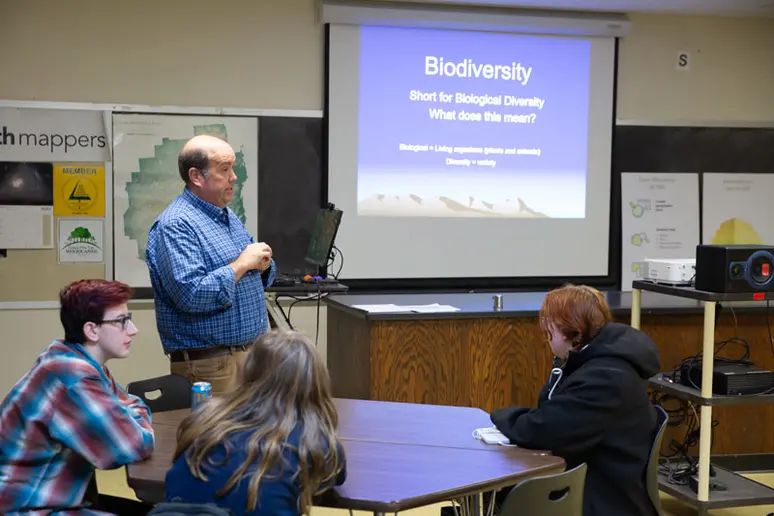There are more Honors courses in science, technology, engineering and mathematics than ever before at SUNY Fredonia – a far cry from the Spring 2016 semester, when Honors courses in STEM disciplines were mostly limited to College Core Curriculum General Education.
Today, Honors students can choose from among three Honors STEM courses – PHYS 152: Observing the Sky, taught by Dr. Michael Dunham; STAT 260: Intro to Data Science, taught by SUNY Distinguished Service Professor Joseph Straight; and EDU 226: The Earth as a System, taught by SUNY Distinguished Teaching Professor Michael Jabot.
Another three STEM courses in Honors to be offered in Spring 2023 include: BIOL 109: Biology, Health and Medicine, taught by Dr. Scott Ferguson; PHY 205: Science and Civilization, taught by Dr. Justin Conroy; and HONR 304: Biodiversity, taught by Dr. Thomas Hegna.
“The increase has been intentional, to reflect the demographic data of Honors students. Today, more than 70 Honors students majoring in a STEM field account for 16 percent of all students in the Honors Program.” - Dr. Natalie Gerber
“The increase [in STEM Honors courses] has been intentional, to reflect the demographic data of Honors students. Today, more than 70 Honors students majoring in a STEM field account for 16 percent of all students in the Honors Program,” said Department of English Professor Natalie Gerber, who also directs the Honors Program.
The almost 50 students majoring in Biology, Biochemistry, Chemistry, Molecular Genetics and Adolescence Education: Biology represent the largest share of Honors students majoring in a STEM field. There are also many Mathematics majors within Honors.
At least two faculty – SUNY Distinguished Teaching Professor Ted Lee and Dr. Jabot – have taught three different Honors courses, and Department of Chemistry and Biochemistry Lecturer Krista Bellis has taught CHEM 113: Chemistry and the Environment, numerous times since 2018. The online format of that course has proven to be especially attractive to Honors students who have very busy class schedules, Dr. Gerber noted.
Jabot also taught HONR 306: Digital Storytelling, in Spring 2022, HONR 227: Natural Science Sustainable Development in Spring 2017; and EDU 226: The Earth as a System, in Fall 2021. This is how Jabot introduced HONR 306: Digital Storytelling ahead of the Spring 2022 semester.
The timely subject of COVID-19 was the focus of a Spring 2022 course, HONR 304: Pandemic Health, taught by former Department of Biology Chair and Professor Lee, who previously taught two other Honors courses: BIOL 109: Biology, Health and Medicine, in Spring 2020 and HONR 227: Natural Science: Aspirin to Viagra, in Fall 2016.
“These are recent selections and are not always offered. They demonstrate that Honors is increasing its courses in STEM,” Gerber said.
“Honors faculty are free to choose how to make their courses distinctive in their disciplines,” Gerber explained, “by adding more hands-on projects, more student discussion-based learning or more rigorous assignments.”
Honors Program courses provide an opportunity for faculty to “teach subject matter closest and dearest to their own research,” Gerber said.
Department of Physics faculty member Conroy and Interim Chair of the Department of Biology William Brown have made a point of working with the Honors Program, Gerber said. They and Dean of the College of Liberal Arts and Sciences Andy Karafa have been very supportive of Honors courses branching out into different disciplines, Gerber said. She also noted that Academic Affairs has offered significant support as well, enabling Honors to diversify its curricular offerings.
A provision in the Honors Program, called a Learning Contract, enables students to substitute part of the program requirements with an applied-learning experience that can include directed study, field experience, a learning assistantship, internship, service-learning project and/or volunteer project, according to the Honors Program website. Other possibilities include study abroad programs, thesis, advanced-learning projects and independent research.
A member of the Honors Program Advisory Board, Lee supports applied-learning experiences and Honduras/study abroad as options for Honors Program learning contracts.
A growing number of students have designated applied-learning experiences involving directed research to take the place of an Honors course.
Zach Yek, a senior Physics major from Kuala Lumpur, Malaysia, and a Keeper of the Dream Scholar, completed an astronomy research project in 2020, for PHYS 469: Directed Research, that culminated in an article, “Detection of a Disk Surrounding the Variably Accreting Young Star HBC722,” published in the journal Research Notes of the AAS (American Astronomical Society). Mr. Yek was awarded the Undergraduate Student Award by the Astronomical Society of New York for the best research by an undergraduate in New York state.
The article, co-written by Yek, Dunham and six additional authors, reported the detection of a disk of material surrounding a young star currently experiencing a dramatic flare in its brightness, representing a temporary burst of accretion of material onto the star.
Joseph Vargas, also a senior majoring in Physics, from Rochester, N.Y., also completed a PHYS 469 Directed Research project with Dunham. Mr. Vargas’ project involved analyzing protostellar data collected during a spatial survey of the Perseus molecular cloud. After Vargas measured by hand the opening angle of protostellar outflows by hand for various collected images, a series of statistical tests was done to ensure the measurements were similar to Dunham’s, Vargas explained.
Since an unknown amount of material from the core of the star gets ejected in these symmetric conical jets, the study may help to understand how stars obtain their final mass.
Vargas described this comparison method in a paper summarizing Dunham's results; the paper could be published sometime next year.
Two Honors students majoring in Molecular Genetics with minors in Chemistry – Raven Crossett, from Horseheads, and Gabrielle Cruz from Erie, Pa. – have been nominated for Goldwater Scholarships, highly competitive, merit-based awards offered to students preparing for careers in mathematics, natural sciences or engineering.
“Honors has amplified its STEM offerings and STEM Honors students are doing amazing things,” Gerber said.





